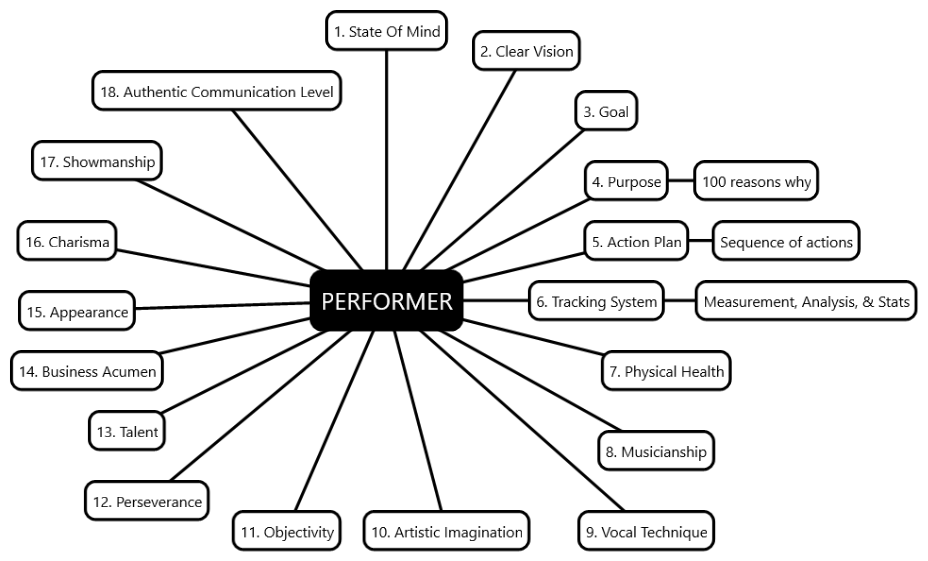Do you know your strong points and your weak points?
POSTURE
- Is your posture stiff when you sing?
- Are you relaxed when you sing?
- Do you slump when you sing?
- Is your head up when you sing? This potentially causes strain.
- Is your head down when you sing?
- Is your head in a relaxed position, facing forward when you sing?
- Is your head tilted when you sing? This may cause strain.
- Are your shoulders down when you sing?
BREATHING
- Does your chest expand when you inhale?
- Is your chest stationary? (If it does not expand, you are constricting your lungs and will not be able to take a full breath)
- Does your abdomen move with your breathing?
- Do you force your abdomen in? Don’t.
- Do you force out your abdomen? Don’t.
- Do you fill up with air? Don’t do this as a habit. It causes unwanted tension.
- Do you run out of air? Under-breathing is a common problem.
- Do you over-breathe?
- Can you feel your diaphragm? It has no proprioceptive nerves and you cannot feel it. Doctors have known this for over a century. Ask your doctor.
- Do you exercise to improve your lung capacity?
TONE QUALITY
- Is your tone clear?
- Is your tone raspy?
- Is your tone strident (harsh)?
- Do you feel you sing from your throat? This is part of a greater singing myth.
- Do you feel you sing from your abdomen? Another myth.
- Is your tone breathy?
- Does your tone crackle?
- Do you start tones with an aspirate attack, a vocal fry, a hard glottal attack or a normal one?
FULL RANGE
- Does your voice have a register break (does it “crack”)?
- Can you sing in full voice in: head voice, low middle voice, high middle voice, and chest voice?
- Do you have one area of a register break or multiple areas?
- Are high notes difficult?
- Do you feel tired, hoarse, raspy, or breathy after singing?
- Are all vowels easy to sing on all pitches?
- Do you think you “mix” chest voice and head voice?
- Do you have a head voice, chest voice, and a break in between?
- Do you have a head, middle, and chest voice with no breaks?
- Can you sing in full voice, light production, and breathy quality in every range?
- Do you have “one voice”, fully controllable and functional throughout the range?
- Can you easily sing at all dynamic levels (soft, medium, loud, very loud)?
- Do you know the one thing that will stop your voice from breaking?
ENDURANCE
- Can you sing without tiring?
- Can you sing for forty-five minutes without tiring?
- Do you have to take frequent rest periods when you sing?
- Do you know how to improve endurance?
ARTICULATION
- Can you pronounce consonants correctly?
- Can you pronounce vowels correctly?
- Do you enunciate clearly?
- Do you under-enunciate?
- Do you over-enunciate?
- Is your enunciation appropriate/typical for the style of song you sing?
- Do you have an accent, foreign to the language in which you sing?
PRACTICE
- Have you been taught how to practice in the most efficient way?
- Do you do vocal exercises which help you to sing well?
- Do you do vocal exercises which seem to do nothing for your singing?
- Do you know how to warm up your voice?
- Do you know music, music theory, and use this in your practice?
- Do you sing songs from start to finish over and over?
- Do you isolate problem areas in sings and do what is needed to improve those?
- Do you record yourself and listen objectively to the recording?
VOCAL USABILITY
- Do you lose your voice?
- Do you get hoarse?
- Do you ever yell or scream?
- Do you stay well-hydrated?
- Do you have caffeine, antihistamines, or alcohol?
- Do you take drugs or smoke cigarettes?
- Do you sing in smoky places?
- Do you frequently speak in the bottom of your voice (or on a fry tone)?
- Do you sleep 8 hours a day?
- Is your body in good health?
- Do you sing when you are ill?
CONTROL
- Can you sing on pitch?
- Can you sing with and without vibrato?
- Can you sing at every volume level?
- Can you sing with emotion?
- Can you sing with no emotion?
- Can you sing in front of people?
- Can you sing with fear, but sound like you are not afraid?
CONFIDENCE
- Do you practice enough to sing with confidence?
- Do you regularly perform?
- Do you sufficiently prepare for auditions?
- Do you sufficiently prepare for performances?
- Do you record video and audio of yourself to ascertain whether you do what you intend to do?
- Do you work to correct what is wrong and record your performance to verify it is corrected?
- Can you be objective when watching or listening to recordings of yourself?
MUSICIANSHIP
- Do you understand melodic intervals?
- Can you sing successive melodic intervals in tune?
- Do you understand harmonic intervals?
- Do you hear the difference between major and minor intervals and/or chords?
- Can you identify: diminished chords, augmented chords, sus2, sus4, altered chords, 7ths, 9ths, 11ths, and 13ths?
- Can you write down music that you hear on manuscript paper?
- Can you identify instruments when you hear them?
- Can you identify duple meter and triple meter?
- Can you notate rhythm?
- Can you sub-divide the beat while singing?
- Can you hear chord progressions and know what you have heard?
- Can you hear how the melodic line you sing fits within the chords?
- Can you hold key when singing a capella?
- Can you sing a chromatic scale a capella and in tune?
- Can you sing all intervals in tune, if they are called out to you?
- Can you sing harmony in a group, without being thrown off by other singers?
- Do you understand music terminology (nomenclature)?
- Can you write a song?
- Can you write lyrics which fit with the chords and rhythm of a song “bed”?
- Can you sing with karaoke, with a band, and/or with an orchestra?
INSPIRATION
Inspiration? It is nourishment to the artist, to the artist’s spirit or soul. It is the key which unlocks your awareness of your talent, your potential, and it is also your fuel. Without inspiration you will never be great. Inspiration comes from many people, places, or things. You may be inspired by success. You may be inspired by failure. You may be inspired by a great singer. You may be inspired by non-musical art, such as paintings or sculptures or dance or even nature. Inspiration can get you started, keep you going and help you to grow as an artist. Seek inspiration. Go and find it. It is everywhere. Don’t wait for it to come to you. Be inspired!
Some people are intimidated by success or by great artists. Some people compare themselves to others and decide they will never be as good as… whomever. This can guarantee failure. It is a stupid thing to do. Don’t do that. Instead, when you encounter greatness, you are observing the reality of potential realized.
MOTIVATION
When you find out why you do what you do, you can be unstoppable. Write 100 reasons why you sing or why your singing goal is a part of you. You can try to do this thing of writing 100 reasons in a day or so, or you can take all the time you need and to evolve.
You can also discover what motivates others and see what does and does not work for you.
If your motivation disappears, find some more. If it dies, your dreams die but it is you who murders your dreams. You can always make a new dream but the core of who you are lives in your dreams, goals and aspirations.
Never blame another for your failure to: do enough, long enough, and good enough. If you blame someone, that person is all and you are nothing. They have power and you pretend you have none. Blame kills both motivation and inspiration. The enemy is not who you blame, the enemy is the act of blaming. To be lame, blame.
Copyright © 2013, 2014, 2015, 2016, 2018, 2019, 2020, 2021, 2022, 2023 Chuck Stewart Music – Chuck Stewart, Vocal Coach

